
By Emmanuel Babafemi
The Central Bank of Nigeria (CBN) has directed four prominent fintech companies – OPay, Palmpay, Kuda Bank, and Moniepoint – to halt the onboarding of new customers until further notice.
This directive comes amid allegations that the accounts of these fintech firms have been used for illicit foreign exchange transactions.
Representatives from two of the affected companies have acknowledged the CBN’s order, though they have expressed concerns that the directive may be misdirected.
They argue that the majority of the implicated accounts are actually held by commercial banks, rather than the fintech platforms themselves.
The move follows recent actions by the Economic and Financial Crimes Commission (EFCC), which obtained a court order to freeze over 1,146 bank accounts linked to individuals and companies allegedly involved in illegal foreign exchange activities.
ALSO READ: UK to detain asylum seekers for deportation to Rwanda, report says
Justice Emeka Nwite granted the EFCC’s request to conclude the investigation within 90 days.
The EFCC’s investigation revealed that the frozen accounts, predominantly deposit money bank accounts, were allegedly used to manipulate the value of the Nigerian Naira through virtual cryptocurrency exchanges and launder proceeds from unlawful activities.
The anti-graft agency emphasized the need to preserve the funds in these accounts pending the completion of the investigation and potential prosecution.
Interestingly, despite the court order focusing on commercial bank accounts, no instructions have been issued to halt new customer onboarding by these banks.
The CBN’s directive to the fintech firms could have significant implications for their operations and customer base, potentially leading to service disruptions if they fail to comply.
The regulatory move aims to enhance transparency by ensuring clear disclosure of license holders on fintech websites, promoting compliance and distinguishing licensed entities from unauthorized ones.
Fintechs relying on others’ licenses may need to carefully navigate these changes, balancing regulatory requirements with the need to protect their intellectual property and customer relationships.


